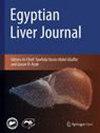Beneficial effects of intermittent fasting on nonalcoholic fatty liver disease: a narrative review
IF 0.7
Q4 GASTROENTEROLOGY & HEPATOLOGY
引用次数: 0
Abstract
Nonalcoholic fatty liver disease (NAFLD) is one of the most common chronic liver diseases, and it is characterized by a series of fatty liver diseases that can lead to severe liver disease. Although no therapeutic drug has been approved as an effective therapy for NAFLD to date, dietary changes and physical activity are thought to be the cornerstone of NAFLD management. For this reason, some articles are available to analyze the studies done so far using various modifications of intermittent fasting (IF) among animals and patients with NAFLD. Data from preclinical and clinical trials suggested that IF positively impacts inflammatory and metabolic markers in both animals and humans. Inflammation and oxidative stress are the major risk factors involved in the pathogenesis of NAFLD. IF has been shown to have positive benefits in alleviating metabolic disorders, promoting the browning of white tissue, resetting circadian rhythm, and activating autophagy of cells. This review is intended to provide a detailed synopsis of the protocols, potential mechanisms of action, and supporting evidence for IF in NAFLD. We will highlight what is currently known about IF approaches in NAFLD treatments in clinical populations with mechanism insight from animal studies, and the safety concerns in certain patient groups. The protocols of intermittent fasting (IF) are various. Data from trials suggested that IF positively impacts both humans and animals. IF has been shown to have potential treatments for nonalcoholic fatty liver disease.间歇性禁食对非酒精性脂肪肝的有益影响:叙述性综述
非酒精性脂肪肝(NAFLD)是最常见的慢性肝病之一,其特征是一系列可导致严重肝病的脂肪肝。尽管迄今为止还没有任何治疗药物被批准作为非酒精性脂肪肝的有效疗法,但饮食改变和体育锻炼被认为是治疗非酒精性脂肪肝的基石。为此,一些文章分析了迄今为止在动物和非酒精性脂肪肝患者中使用各种间歇性禁食(IF)方法所做的研究。来自临床前和临床试验的数据表明,间歇性禁食对动物和人类的炎症和代谢指标都有积极影响。炎症和氧化应激是导致非酒精性脂肪肝的主要危险因素。研究表明,IF 在缓解代谢紊乱、促进白色组织褐变、重置昼夜节律和激活细胞自噬方面具有积极的益处。本综述旨在详细概述 IF 治疗非酒精性脂肪肝的方案、潜在作用机制和支持证据。我们将重点介绍目前已知的非酒精性脂肪肝临床治疗中的间歇性禁食方法、动物实验中的作用机制,以及某些患者群体的安全性问题。间歇性禁食(IF)的方案多种多样。试验数据表明,间歇性禁食对人类和动物都有积极影响。间歇性禁食已被证明具有治疗非酒精性脂肪肝的潜力。
本文章由计算机程序翻译,如有差异,请以英文原文为准。
求助全文
约1分钟内获得全文
求助全文

 求助内容:
求助内容: 应助结果提醒方式:
应助结果提醒方式:


